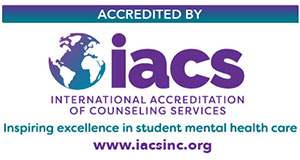Training Aims and Competencies
In accordance with the Standards of Accreditation in Health Service Psychology outlined by the American Psychological Association, the internship training program at BUCC adheres to the following training aim and competencies:
Training Aim
We will prepare doctoral interns in clinical or counseling psychology to become entry-level Health Service Psychologists through participation in a year-long university counseling center mental health setting.
Training Competencies
The Baylor Doctoral Internship will build upon the interns’ achievement of the profession-wide competencies required for a career in health service psychology. Because science is at the core of health service psychology, we rely on the current evidence base when training and assessing interns in the competency areas. Interns must demonstrate a minimum level of competence in the following areas:
- Research
- Demonstrates the substantially independent ability to critically evaluate and disseminate research or other scholarly activities (e.g., case conference, presentation, publications) at the local (e.g., BUCC), regional (e.g., TUCCCC), or national level.
- Ethical and legal standards
- Recognizes ethical dilemmas as they arise and apply ethical decision-making processes in order to resolve dilemmas.
- Conduct self in an ethical manner in all professional activities.
- Is knowledgeable of and acts in accordance with: The current version of the APA Ethical Principles of Psychologists and Code of Conduct.
- Is knowledgeable of and acts in accordance with: Relevant laws, regulations, rules, and policies governing health service psychology at the organizational, local, state, regional, and federal levels.
- Is knowledgeable of and acts in accordance with: Relevant professional standards and guidelines.
- Individual and cultural diversity
- Demonstrates an understanding of how own personal/cultural history, attitudes, and biases affect how they understand and interact with people different from themselves.
- Demonstrates knowledge of the current theoretical and empirical knowledge base as it relates to addressing diversity in all professional activities including research, training, supervision/consultation, and service.
- Demonstrates the ability to integrate awareness and knowledge of individual and cultural differences in the conduct of professional roles – including the ability to apply a framework for working effectively with areas of individual and cultural diversity not previously encountered over the course of their career. Also included is the ability to work effectively with individuals whose group membership, demographic characteristics or worldviews create conflict with their own.
- Demonstrate the ability to independently apply their knowledge and approach in working effectively with the range of diverse individuals and groups encountered during internship.
- Professional values, attitudes, and behaviors
- Behaves in ways that reflect the values and attitudes of psychology, including integrity, deportment, professional identity, accountability, lifelong learning, and concern for the welfare of others.
- Engages in self-reflection regarding one’s personal and professional functioning; engages in activities to maintain and improve performance, well-being, and professional effectiveness.
- Actively seeks and demonstrates openness and responsiveness to feedback and supervision.
- Responds professionally in increasingly complex situations with a greater degree of independence as they progress across levels of training.
- Communication and interpersonal skills
- Develops and maintains effective relationships with a wide range of individuals, including colleagues, peers, supervisors, supervisees, other staff/professionals, parents, communities, organizations, and those receiving professional services.
- Produces and comprehends oral, nonverbal, and written communications that are informative and well-integrated, demonstrating a thorough grasp of professional language and concepts.
- Demonstrates effective communication and interpersonal skills, understanding the impact of their interpersonal and communication practices.
- Demonstrates ability to manage difficult communication well.
- Assessment
- Selects and applies assessment methods that draw from the best available empirical literature.
- Demonstrates ability to collect relevant data and assessment information using multiple sources and methods appropriate to the goals and referral questions, and relevant diversity characteristics of the recipient.
- Demonstrates ability to accurately interpret assessment data following current research, according to professional standards and guidelines, to inform case conceptualization, classification, and recommendations, while guarding against decision-making biases, distinguishing the aspects of assessment that are subjective from those that are objective.
- Communicates orally and in written documents the findings and implications of the assessment in an accurate and effective manner sensitive to a range of audiences.
- Demonstrate current knowledge of diagnostic classification systems, functional and dysfunctional behaviors, including consideration of client strengths and psychopathology.
- Demonstrate understanding of human behavior within its context (e.g., family, social, societal and cultural).
- Demonstrate the ability to apply the knowledge of functional and dysfunctional behaviors including context to the assessment and/or diagnostic process.
- Intervention
- Demonstrates ability to establish and maintain an effective therapeutic relationship with diverse clients presenting with different types of concerns.
- Demonstrates ability to formulate treatment strategies that integrate theory, current evidence-based information, assessment findings, diversity and contextual variables.
- Implement interventions informed by the current scientific literature, assessment findings, diversity characteristics, and contextual variables.
- Demonstrates the ability to apply the relevant research literature to clinical decisions making.
- Evaluates intervention effectiveness and adapts intervention goals and methods consistent with ongoing evaluation.
- Supervision
- Applies supervision knowledge and learnings from scientific/scholarly work in the supervision of a practicum trainee.
- Consultation and inter-professional/interdisciplinary skills
- Demonstrates knowledge and respect for the roles and perspectives of other professions and professionals.
- Applies knowledge about other professions in consultation with other health-care professionals, inter-professional groups, and/or systems related to health or behavior.
- Outreach
- Demonstrates ability to plan and conduct outreach programs that are evidence-based and culturally and developmentally appropriate for the targeted public, demonstrating the skills of a Health Service Psychologist.
